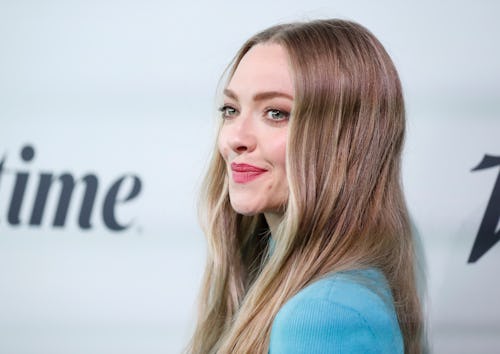
Amanda Seyfried has been in the public eye as a movie star for almost two decades, since her breakthrough role in Mean Girls in 2004. But with her recent Hulu show The Dropout, a dramatization of the Elizabeth Holmes story that has blown away expectations, Seyfried is finding herself at 36 catapulted to the kind of “it girl” fame that gobbled up some of her contemporaries at much younger ages.
At this stage in her life and career, though, she feels more prepared to take on the responsibilities and pressure of superstardom, which she’s largely evaded while living on a farm in upstate New York. “I’ve never been super famous,” she told Marie Claire in a new interview. “It’s been the healthiest trajectory. [It’s] not a scary spike. I have my priorities. I know who I am. I know where I’m going. I know what it means. It means that I’m getting to do what I love. I’m actually not afraid of it now.”
But things weren’t always quite so sunny. Seyfried also recounted some uncomfortable — and sexist — interactions she experienced in the wake of the Mean Girls success. After the movie came out, Seyfried told Marie Claire, she found herself on the receiving end of some unsettling attention from men. Her character in the film, Karen, could forecast the weather with her breasts, a comedic spoof that spoke to her character’s erudite aloofness. But when boys approached her in real life and asked if it was raining, it wasn’t so funny. “I always felt really grossed out by that,” she said. “I was like 18 years old. It was just gross.”
While she continued to work — with film and TV credits including Mamma Mia!, Letters to Juliet, and Veronica Mars — Seyfried did find refuge with her country house in New York’s Catskills. It was an important move for her wellbeing, as someone who knew well enough how being in Hollywood can take its toll. “I think being really famous [young] must really fucking suck. It must make you feel completely unsafe in the world,” she told Marie Claire. “I see these younger actors who think they have to have security. They think they have to have an assistant. They think their whole world has changed. It can get stressful. I’ve seen it happen to my peers. So, I bought a farm. I was like, let’s go in the opposite way.”
Clearly, it was the right decision for Seyfried; now she’s more ready than ever for this next level of fame. And the world is receptive to her talents in a whole new way — which hopefully won’t include gross comments from guys about the weather.







